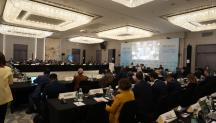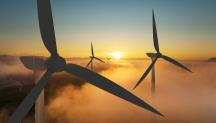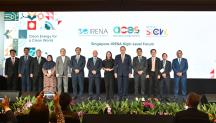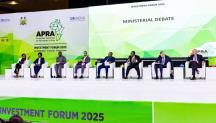

Integrating UAE Consensus in National Climate Plans NDCs 3.0
Newsletter
Scaling up renewables and improving energy efficiency are the most logical and least costly actions that can be taken by 2030 if the world is to achieve net zero by 2050. Rooted in IRENA’s World Energy Transitions Outlook, this is one of the key energy outcomes of the UAE Consensus as agreed at COP28 in Dubai, a landmark agreement to transition away from fossil fuels and keep the climate target of 1.5 °C within reach.
With the third round of national climate plans (NDCs) submissions due in early 2025 before COP30 in Belem, Brazil, countries are expected to define higher levels of mitigation ambition along the UAE Consensus. NDCs 3.0 must particularly reflect the global goal of tripling renewable power capacity by 2030.
At COP29 in Baku, IRENA, the United Arab Emirates and the Global Renewables Alliance (GRA) co-hosted a side-event at the Global Renewables Hub to discuss challenges and opportunities of “Integrating UAE Consensus Energy Outcomes with NDCs 3.0”.
🎯Despite a record 473 GW of #renewable capacity added in 2023, an annual growth rate of 16.4% is needed to meet the #UAEConsensus.
— IRENA (@IRENA) November 15, 2024
⭕️Govt. of UAE, @IRENA & @GRA_Renewables jointly hosted a side event at #COP29 today to outline challenges & opportunities for ensuring the… pic.twitter.com/PKloNC7dzQ
“It is not just about ambition”, said IRENA Director-General Francesco La Camera, “It’s about translating the ambition into action. Aligning our progress with a 1.5°C trajectory requires coordinated global action to overcome the structural and systemic barriers that hinder our advancement.”
The event was opened by H.E. Dr Nawal Al-Hosany, the Permanent Representative of UAE to IRENA and followed by key notes by H.E. Mr Toeolesulusulu Cedric Pose Salesa Schuster, Samoa’s Minister of Natural Resources and Environment, Ms Mariana Especie, Special Adviser to the Energy Minister of Brazil (incoming COP30), Mr Ali Mohammed, Chair of the Africa Group of Negotiators and Special Envoy on Climate Change in the Office of Kenya’s President as well as H.E. Dr Nkiruka Chidia Maduekwe, Special Presidential Envoy on Climate Action and Director-General of the National Council on Climate Change in Nigeria, amongst others.
“Our commitment under our new NDCs was to keep a high level of renewables. We are going to add almost 70 gigawatts until 2034 into the Brazilian energy matrix. All of them are renewables and to follow this movement we are also taking into consideration the need to reinforce, to re-enhance the national grid.” said Ms. Mariana Esposito, Special Advisor to the Minister of Mines and Energy in Brazil. She emphasised the need for concrete action and collaboration, highlighting the launch of the Global Coalition for Energy Planning in partnership with IRENA, as a means of supporting developing countries in implementing their medium and long-term energy policies.
H.E. Ali Mohammed added, “By the time we meet in Brazil next year with updated NDCs, we should be able to demonstrate that we are closing the ambition gap through large-scale renewable energy deployment, and importantly, that we are bridging the finance gap needed to turn ambition of developing countries into real impact on the ground.” Despite abundant renewable resources, Africa's energy transition has been slow. However, innovative partnerships like the Accelerated Partnership for Renewables in Africa (APRA), highlighted at COP29 where leaders voiced support the renewable energy partnership, are key to addressing disparities in the developing world to unlock financial flows for renewable energy deployment, aligning with the goals of the UAE Consensus.
Although countries have been pledging ambitious climate targets through their updated NDCs, the pathways outlined in these NDCs are insufficient to reach the Paris Agreement goals. To support this process, IRENA has engaged with 101 countries that are Parties to the 2015 Paris Agreement.
The 2030 targets of #3xRenewables & #2xEnergyEfficiency are crucial milestones for keeping 1.5 °C alive.🌐
— IRENA (@IRENA) November 15, 2024
Launched at #COP29, new report examines national & regional efforts to enhance & implement #climate targets, & the related assistance provided by @IRENA through its work… pic.twitter.com/TicmisXnfu
Through this country engagement, IRENA assists in the enhancement and implementation of NDCs with a focus on the energy sector, according to the Agency’s new ‘Climate Action Support 2024’ report that was presented during the event.
The engagement with its member countries covers a total population of around 5.9 billion people and combined greenhouse gas emissions totaling an estimated 31 818 million tonnes of CO2 equivalent in 2023.




